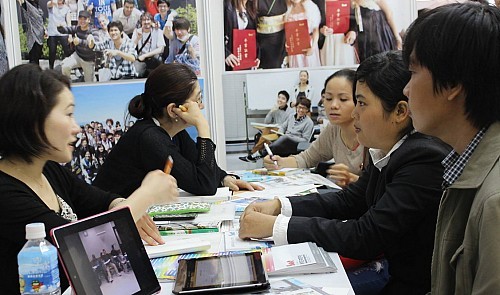(VOVworld) – Education cooperation between Japan and Ho Chi Minh City has been one of the highlights of bilateral relations. Exchange programs of students and teachers as well as various collaboration projects evidence improving education cooperation.
 |
| Vietnamese students learn about education in Japan at a fair in Ho Chi Minh City. (Photo: tuoitrenews.vn) |
In recent years, many prestigious Japanese groups have invested in projects to boost a modern and friendly educational climate in Ho Chi Minh City.
Since 2012, Ajinomoto Vietnam Company has helped the municipal Education and Training Department carry out a “School Meal Project” to improve the nutrition of pupils in the city’s day-boarding primary schools.
Trung Trac Primary School in District 11 was chosen to pilot a “Model Day-Boarding School Kitchen” under the “School Meal Project”. Phan Van Tri, the school’s rector, says the Ajinomoto Vietnam Company donated 57,000 USD to build and equip a kitchen with basic cooking equipment and gadgets.
“The model ensures food safety and hygiene, makes optimal use of the kitchen area, and makes the work of the cooks easier. The model has also made meals more delicious and nutritious,” Tri added.
Cooperation programs in training and transfer of technology are applied at higher school levels. The Ho Chi Minh City University of Agriculture and Forestry has worked with more than 20 Japanese schools and research institutes, including Kobe University, Kyushu University, Osaka University, and Saga University.
Hoa Sen (Lotus) University has organized several student exchange programs with Japan. 75 students went to the each other country to study and experience the local lifestyle.
Dinh Anh Lan, director of public relations and media at Hoa Sen University, told us: “Cultural and educational exchanges are the foundation for developing relations between the two countries. After graduation the students will work for various companies and agencies to tighten the cooperative ties between Vietnam and Japan.”
Vocational training is a cooperative field that has made great strides. Tran Thanh Hai, rector of the Vien Dong (Far East) College, says the school has cooperated with Nakanihon Automotive College in Nagoya, Japan, since 2014. Next month, the Far East College will send its lecturers in automotive technology to study electric and hybrid cars at Nakanihon Automotive College. Some students of Far East College will go to Nakanihon Automotive College for a year and a half to earn international automotive engineering certificates. The Far East College has boosted cooperation with Japan in nursing, construction, and mechanics.
Tran Thanh Hai, the college’s rector, said cooperation with Japan has raised the school’s awareness of teaching and learning methods, adding: “We have selected subjects that are practical and in line with international standards. Our students have changed their thinking about careers and a more positive learning atmosphere has been created.”
Ho Chi Minh City’s education sector has collaborated with the Japan Foundation to train Japanese language teachers for middle schools and high schools. The municipal authorities have licensed 40 foreign language centers to teach Japanese.
Cooperative programs with Japan have helped Ho Chi Minh City’s education sector approach international standards and consolidate the bilateral ties established 40 years ago.